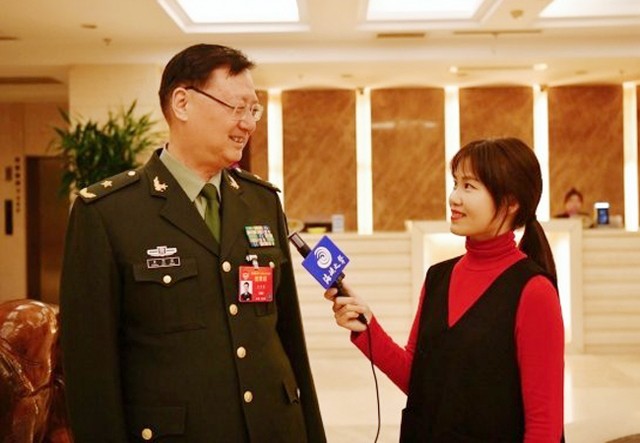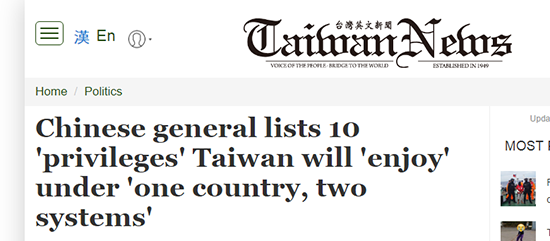Source: Taiwan News

Wang Weixing (left). (Screenshot from Voice of the Strait)
TAIPEI (Taiwan News) -- In a recent interview with the Chinese People's Liberation Army (PLA) propaganda radio program Voice of the Strait, a Chinese general listed 10 supposed privileges Taiwan would enjoy under the "one country, two systems" framework.
PLA Major General Wang Weixing started the lecture by saying that the people of Taiwan were ultimately deceived by serious stigmatization and demonization of the "one country, two systems" framework and "lost their right to know the truth." Wang claimed that the reasons for their vague understanding are complex:
Wang claimed that if Taiwan's reunification was achieved under the model of "peaceful reunification and one country, two systems, Taiwan could be granted 10 privileges." He said that under the "one country, two systems" system, Taiwan would essentially have a local government under a unified state structure, but its powers would be greater than those of the provinces of China mainland, and also greater than those of Hong Kong and Macau.
The 10 privileges are as follows:
1. The Taiwan government, with the authorization of the central government, forms its own administrative organs.
The name of Taiwan after reunification may be the "Taiwan Special Area of the People's Republic of China." Taiwan will administer itself in accordance with the "Basic Law of Taiwan," and China will not send personnel or administrative staff to Taiwan.
Taiwan will administer its own party, government, and military systems. At the same time, the Chinese central government has set aside spots for Taiwan. Representatives of Taiwan will be allowed to participate in the central government and participate in the management of state affairs.
2. Taiwan's legislative power rests with Taiwan's own legislature.
Under the authorization of the central government, the legislature will be composed by Taiwan itself and it may enact Taiwanese laws that do not undermine the "reunification of the motherland" and national sovereignty.
3. Taiwan will have its own administrative power.
According to the requirement of self-management of Taiwan's party, government, and military systems, it can formulate and implement policies and measures different from the mainland. It can also establish its own administrative system and public personnel system.
4. Taiwan will have independent judicial power.
Taiwan can retain the original laws that do not conflict with the "reunification with the motherland" and national sovereignty. Taiwan's courts can enjoy independent jurisdiction and the right of final adjudication.
5. Taiwan will enjoy certain foreign affairs rights.
Apart from the transfer of diplomatic power to the central government, Taiwan will have great power in dealing with foreign affairs. Under the authorization of the central government, Taiwan can also sign agreements with other countries, regions, and relevant international organizations in the name of "Taipei" or "Taiwan, China" to maintain and develop economic and cultural relations.
6. Taiwan will be able to maintain its own defense.
Taiwan may retain its own army, be responsible for Taiwan's defense and security, and ensure that the Taiwan region is not violated by foreign forces, provided it does not pose a threat to the mainland.
7. Taiwan will have financial independence.
Based on the needs of economic development and regional management, Taiwan can open up it own financial resources, make its own budgetary decisions and manage its own financial affairs. The central government will not levy taxes on Taiwan and, if necessary, it will also grant financial subsidies.
8. Taiwan will implement an independent monetary system.
Taiwan may formulate its own monetary policy according to its needs, issue Taiwanese currency by designated banks in the special zone, adopt a separate exchange rate, and control its own foreign exchange reserves.
9. Taiwan may have tariff zones.
Under the premise of one China and the unification of tariff sovereignty, Taiwan can setup tariff zones, levy tariffs on foreign commodities, and turn them into its financial resources.
10. Taiwan will have the right to issue its own passports or other travel documents.
On the premise of ensuring national sovereignty, security, and development of interests, after "peaceful reunification," the social system and lifestyle of "Taiwan compatriots" will be fully respected, and their private property, religious beliefs, and legitimate right and interests will be fully guaranteed.
Disclaimer: This article was originally produced and published by Taiwan News. It is edited by the China Military Online.










